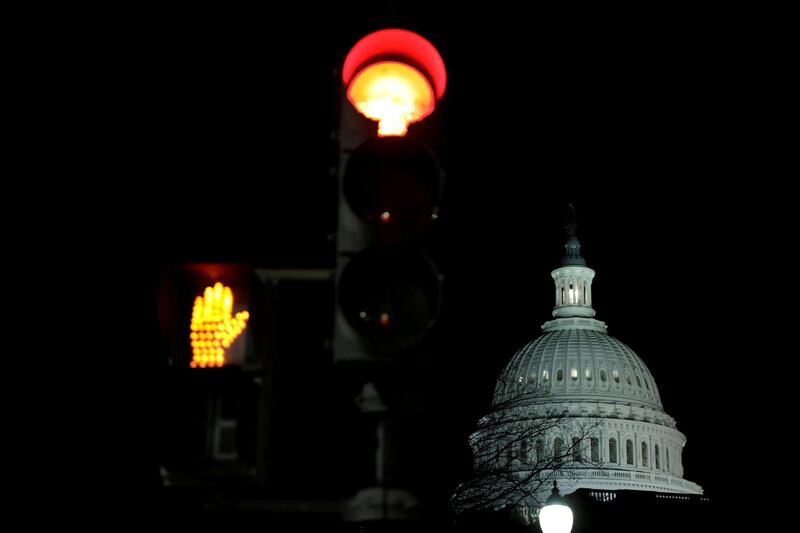On the first anniversary of the swearing in of president Donald Trump, Republicans and Democrats are blaming each other for the shutdown of the US government.
Mr Trump and the US Congress failed to reach a deal on funding for federal agencies, highlighting the country's deep political divisions, prompting the shutdown of the world's most powerful government.
In Twitter posts early on Saturday, Mr Trump blamed Democrat lawmakers.
"This is the One Year Anniversary of my Presidency and the Democrats wanted to give me a nice present," he said.
"Democrats are far more concerned with illegal immigrants than they are with our great military or safety at our dangerous southern border," he said. "They could have easily made a deal but decided to play shutdown politics instead."
For the first time since October 2013 - when a similar standoff that lasted 16 days kept only essential agency operations intact - federal workers were being told to stay at home or in some cases to work without pay until new funding is approved.
"Tonight, they put politics above our national security, military families, vulnerable children, and our country’s ability to serve all Americans," said White House press secretary Sarah Sanders.
One year into the Trump presidency, Democrats can't shut down the booming Trump economy so they shut down the government instead. This is the behavior of obstructionist losers, not legislators. Do your job Democrats: fund our military and reopen our government #SchumerShutdown
— Kayleigh McEnany 45 Archived (@PressSec45) January 20, 2018
But Mr Trump's inability to cut a deal despite having a Republican majority in both houses of Congress marks arguably the most debilitating setback for his crisis-plagued administration.
Democrats had insisted that any bill to renew government funding also contain permanent protections for approximately 700,000 young, undocumented immigrants who were brought illegally into the US as children.
Last week, Mr Trump rejected a bipartisan Senate deal that would have accomplished that as well as hand the White House $2.7 billion in new money for immigration enforcement at America's borders.
The shutdown was cemented when the Senate, meeting late into Friday night, blocked a bill to maintain the federal government's funding through to February 16.
The vote was 50-49, well short of the 60 needed in the 100-member chamber to vault the bill over a procedural hurdle.
Four Republicans joined most Democrats in killing the measure. A fifth Republican, Senate majority leader Mitch McConnell, voted "no" too, but only as part of a parliamentary maneuver to make it easier to bring another bill to the floor.
The breakdown ended a long day of closed-door meetings in Congress and at the White House.
Even as they promised to work on getting the government back up again as soon as possible, Republicans and Democrats blamed each other for the predicament.
_______________
Read more:
With no deal in sight, US Congress faces looming government shutdown
US government headed for shutdown amid senate stand-off
_______________
Senate majority leader Mitch McConnell joined Mr Trump in attacking Democrats.
"What we've just witnessed on the floor was a cynical decision by Senate Democrats to shove aside millions of Americans for the sake of irresponsible political games," Mr McConnell said.
Senate Democratic Leader Chuck Schumer said his party took significant steps to reach a deal, including raising the possibility of funding for Mr Trump's proposed wall along the US border with Mexico, which they have ardently opposed.
"It's almost as if you were rooting for a shutdown," Mr Schumer said in comments on the Senate floor aimed directly at president Trump.
Nobody wants to shut down the govt, not Dems, not the GOP.
— Chuck Schumer (@SenSchumer) January 19, 2018
The only one who has ever rooted for a shutdown is @realDonaldTrump who said our country could use “a good shutdown” – only he could come up with that. But no shutdown can be good for the American people.
Republican and Democratic leaders are expected to renew negotiations on Saturday in the hope of restoring government financing before Monday.
The immediate impact of the government shutdown was also eased somewhat by its timing, starting on a weekend when most government employees normally do not work.
No matter the timing, the Defense Department said its combat operations in Afghanistan and other military activities would continue, while federal law enforcement officers also would remain on duty.
Without a quick deal, most day-to-day operations in the federal government will be disrupted. Hundreds of thousands of government employees will be put on temporary unpaid leave, including many of the White House's 1,700 workers.
Mr Trump's administration said it planned to keep national parks open with rangers and security guards on duty. The parks were closed during the last shutdown in 2013, upsetting many tourists and resulting in the loss of $500 million in visitor spending in areas around the parks and at the Smithsonian museums.
No one is likely to be on hand, for instance, to manually wind an historic clock outside the US Senate chamber. Many Capitol maintenance workers also were being instructed to stay home.
The shutdown will start to have more serious consequences on Monday as government employees ranging from financial regulators and tax collectors to scientists and civilian staff at the Pentagon will have to stay away from work.
Early on Saturday, Mr McConnell offered up a new plan. Instead of the February 16 end date for the temporary spending bill, he proposed February 8.
Senate Democrats had argued this week for an extension of just four or five days to force both sides into serious negotiations on the immigration issue.






